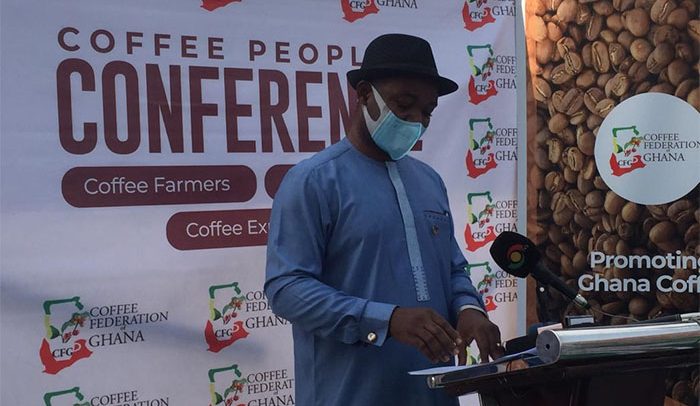Chief Nathaniel Ebo Nsarku, President of the Coffee Federation of Ghana, addressing the media
The Coffee Federation of Ghana has called on Government to honour its promise of increasing investments and transforming the coffee sector in Ghana.
According to the Federation, it was imperative that Government honoured its promise so as to help meet the set targets for the sector.
President of the Coffee Federation of Ghana, Chief Nathaniel Ebo Nsarku, who made the call on Wednesday, February 17, 2021, in an address delivered to the media in Accra, recounted that at the 2020 Inter-African Coffee Organization (IACO) conference held virtually in Accra, President Nana Akufo-Addo indicated that Ghana has a set target of realizing $2 billion by 2030, “and that means farming up to 220,000 hecters of coffee in order to harvest about 900,000 tonnes.”
He stated that the government tree crop policy has identified coffee as one of the six tree crops to be supported to reduce the country’s over-reliance on cocoa.
He added that the policy was expected to boost the coffee sub-sector to ensure that the crop generates approximately $2 billion in foreign exchange annually.
He explained that “in this regard, COCOBOD and MMDAs have been tasked to improve access to good planting materials, extension services and other conditions to help move the sector to the next level. In addition, they are to ensure competitive and growing local market characterized by high demand for the produce, reliable and increasing farm gate prices, increasingly higher farmer motivation and growing interest among the youth.”
He indicated that “the Ghanaian coffee sector today presents enormous opportunities for the youth and farmers in general as the new policy direction of government will provide impetus to transform the sector immensely.”
As a result, he said the needed investments must be in place to help transform the coffee sector.
He revealed that currently, Ghana’s coffee production is estimated at about 1.4 tonnes per hectare which for him is far from the target of 4-5 tonnes per hectare.
According to him, there was the need for expediting action on the creation of the division for coffee to facilitate the engagement of actors in the sector towards its transformation.
He noted that “as the Coffee Federation of Ghana, we will want to work directly with COCOBOD since coffee was not included in the Tree Crop Authority.”
He indicated that the industrialization of coffee was simpler than cocoa, adding that “with coffee, a little support Ghana could process it domestically for consumption.”
By Melvin Tarlue


